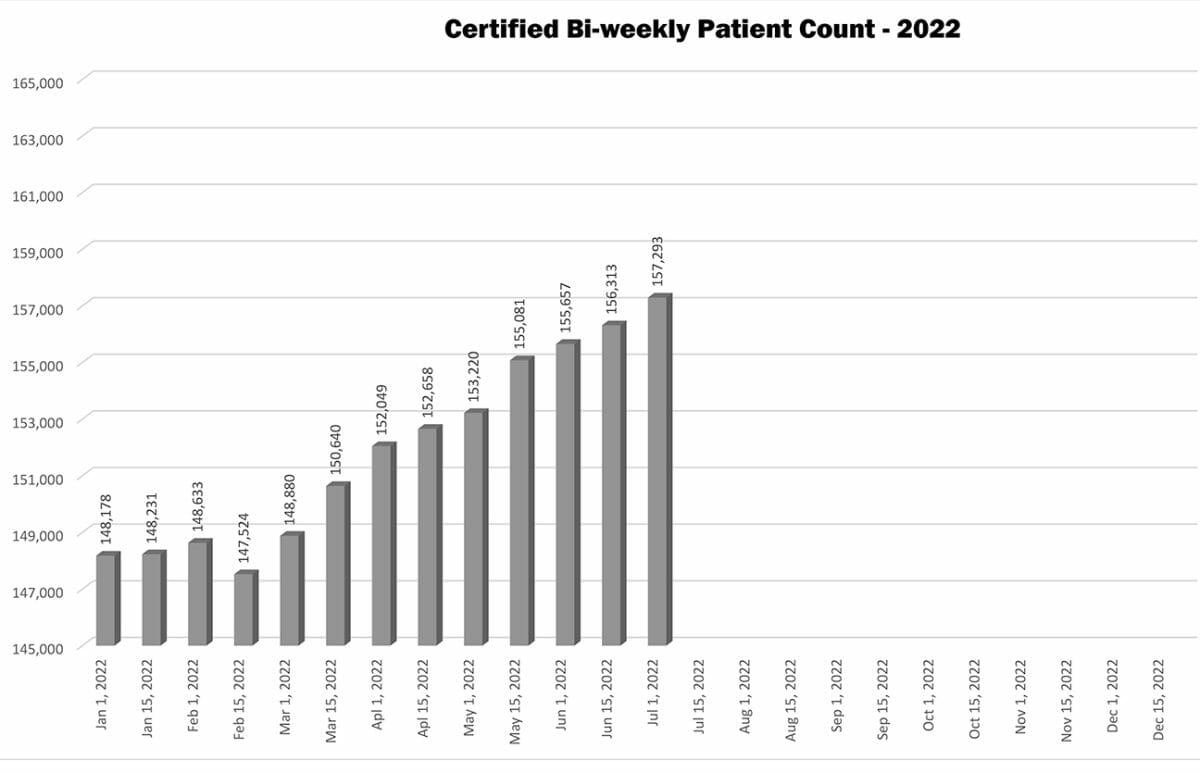Post-traumatic stress disorder (PTSD) is a medical condition that is increasingly common even amongst nonveterans, as PTSD can be triggered by any traumatic experience regardless of its nature.
Medical marijuana was found to help patients with anxiety, reducing inflammation, and even treating conditions that can become life-threatening. Indica-dominant marijuana plants like the blueberry kush strain, also have a notable efficacy when treating chronic pain.
According to the U.S. Department of Veterans Affairs, “About 6 out of every 100 people (or 6% of the population) will have PTSD at some point in their lives”. While antidepressants and trauma-focused psychological treatment are the most common prescriptions, doctors in Maryland are widely advocating for the value and benefits of medicinal marijuana as an alternative treatment for PTSD.
Increasing Marijuana Recommendation Letters in Maryland
Between 2020 and 2021, the Maryland Medical Cannabis Commission reported a 42 percent increase in the number of patients registered for the use of medical cannabis.

Doctors in Maryland can recommend the use of medical marijuana for a number of qualifying conditions:
- Anorexia
- Glaucoma
- Seizures
- Chronic or severe pain
- PTSD
- Depression
- Cancer
- Anxiety
Nevertheless, doctors can recommend Maryland patients for medical marijuana treatment in other cases too, as long as they determine that such treatment would be valuable.
Reasons Why Doctors In Maryland Recommend Medical Marijuana For PTSD
Medical marijuana was found to help patients with anxiety, reducing inflammation, and even treating conditions that can become life-threatening. But when it comes to treating PTSD, these are the most common reasons why doctors in Maryland will recommend medical marijuana:
1. It Shows Positive Results
In 2020, studies showed that people suffering from PTSD who used cannabis were 2.5 times more likely to recover. The findings suggest that after consuming medical marijuana, patients showed reduced activity in the amygdala, the part of our brain that is primarily responsible for emotional processes. Cannabinoids were also found to play an active role in alleviating traumatic memories.
The use of cannabis in treating PTSD is considered to be highly effective in reducing the severity of PTSD symptoms and preventing their worsening.
3. It Has Fewer Side Effects
Common medication and treatment for PTSD can show adverse reactions in patients, some of which may not disappear in time. The most common side effects of PTSD medication include:
- Severe weight loss
- Insomnia
- Vomiting
- Congenital disabilities
In opposition, medical marijuana can show moderate side effects such as dizziness or fatigue, however, severe side effects are rare and frequently linked to other medical conditions.
4. It Is Accessible
Maryland patients who wish to start using medical marijuana for treatings PTSD symptoms can easily apply for a medical marijuana card Maryland. A doctor consultation will identify whether or not the individual qualifies for a medical card and will support them through the process of becoming certified.
5. It’s a Lot Safer
Medical marijuana is considered a natural remedy, thus eliminating the risk of developing complications or facing severe side effects. The risk of developing an addiction to marijuana is extremely low, as opposed to opiates used in treating chronic pain or other long-term medication for PTSD.
Moreover, medical marijuana will undergo numerous tests before it is handed to the patient. US safety requirements will carefully check and analyze for contaminants, making sure that patients receive safe and clean products.
6. It Can Treat Many PTSD Symptoms
PTSD symptoms can range from depression and anxiety to flashbacks, nightmares, and severe panicking. Medical marijuana is recommended by doctors for treating a multitude of symptoms. Some of the most appreciated effects are on improving sleep, reducing anxiety, improving cerebral blood flow, and reducing fear.
7. It’s Cost-Effective
Medical marijuana card holders in Maryland can save up to 10% on every purchase. As opposed to recreational users, patients with a medical marijuana card will not be subject to any taxes or sales upon making a purchase.
Bottom Line
Medical marijuana is subject to active research and trial, as its benefits in treating PTSD symptoms are being acknowledged globally. If you are seeking for a medical marijuana card in Maryland, make sure to get a consultation with a doctor beforehand.
As a medical journalist, Katherine Hallow wrote countless articles, guidelines, and news covering the healthcare system, the opioid crisis, advancements in the medical field, and more. In the past years, she focused on the research and developments surrounding medical marijuana, tackling the subject from multiple perspectives, including legislation, certifications, patients’ rights, etc. Katherine wants to educate and inspire healthcare professionals and people in finding alternative health solutions.
